专题14 时态(课件)-2024年小升初英语复习讲练测(全国通用版)(共42张PPT)
文档属性
| 名称 | 专题14 时态(课件)-2024年小升初英语复习讲练测(全国通用版)(共42张PPT) |  | |
| 格式 | pptx | ||
| 文件大小 | 43.4MB | ||
| 资源类型 | 试卷 | ||
| 版本资源 | 通用版 | ||
| 科目 | 英语 | ||
| 更新时间 | 2024-06-17 18:21:56 | ||
图片预览

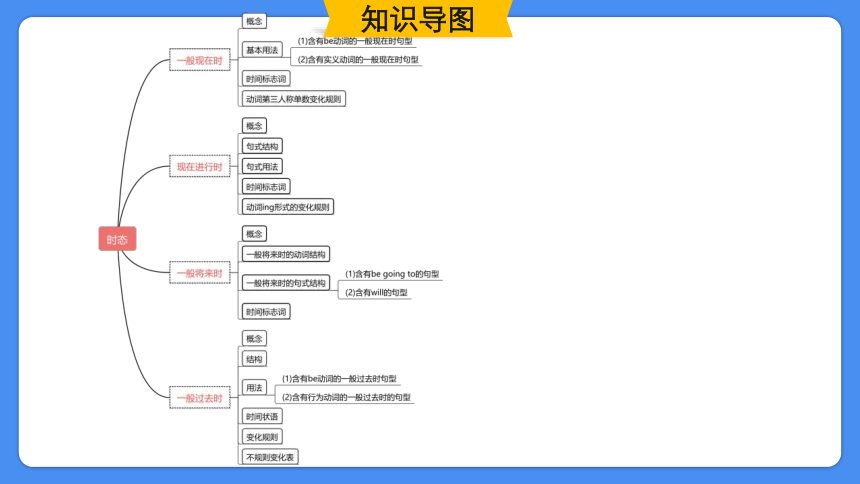
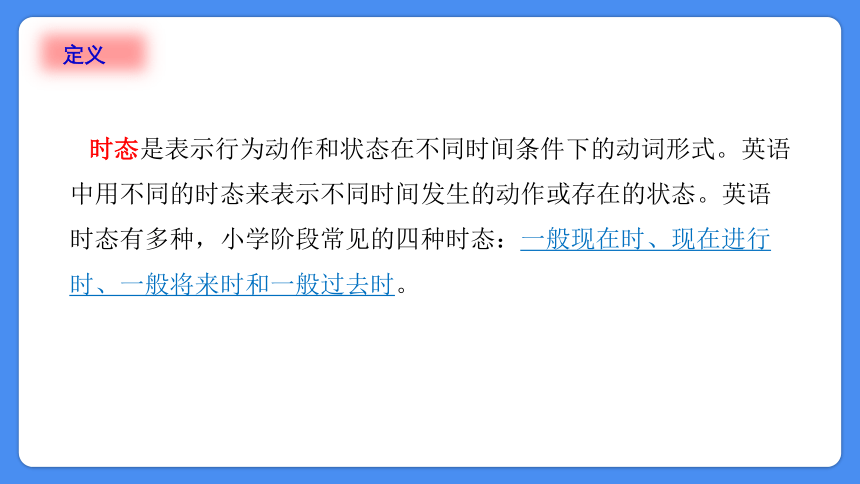
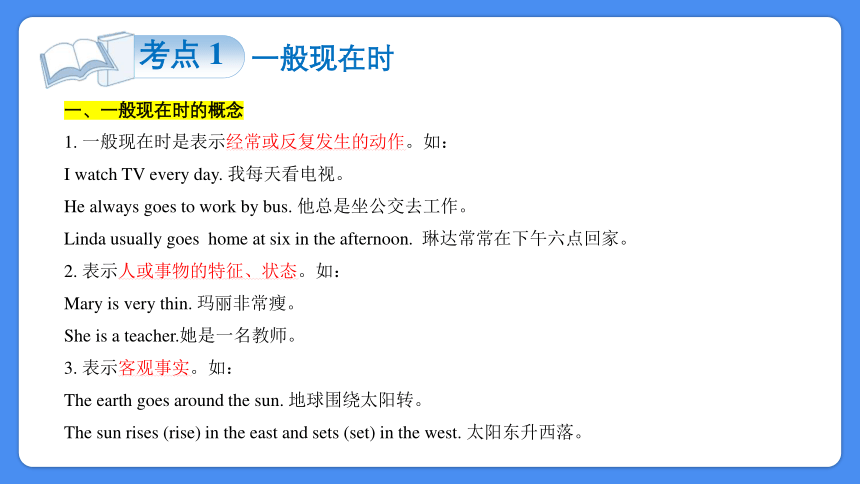
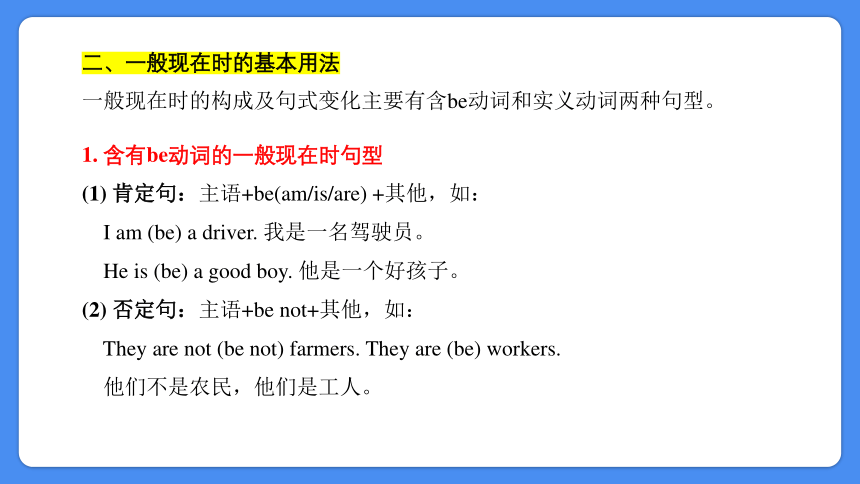

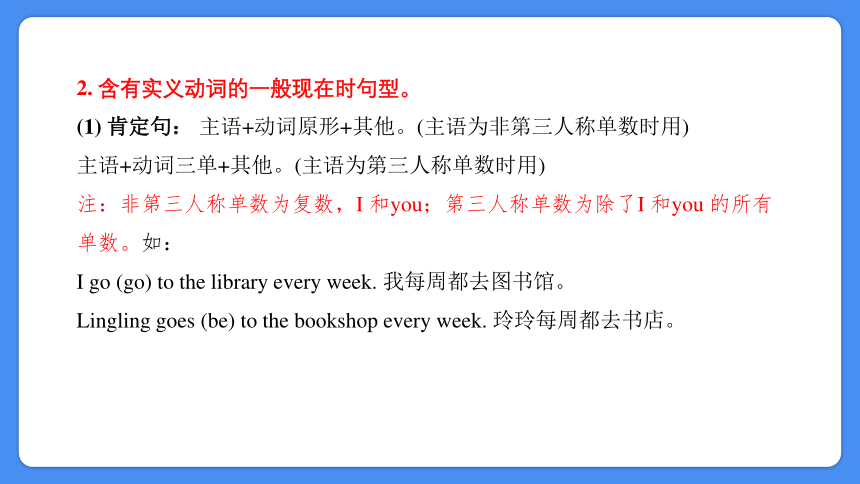
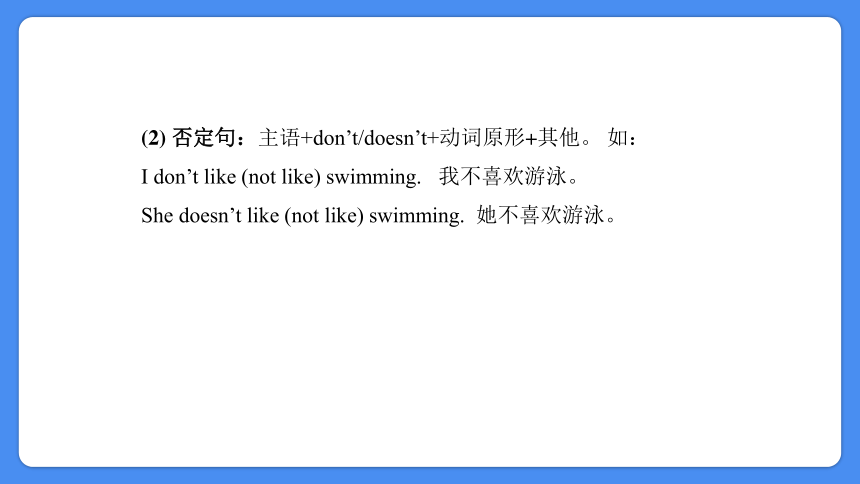
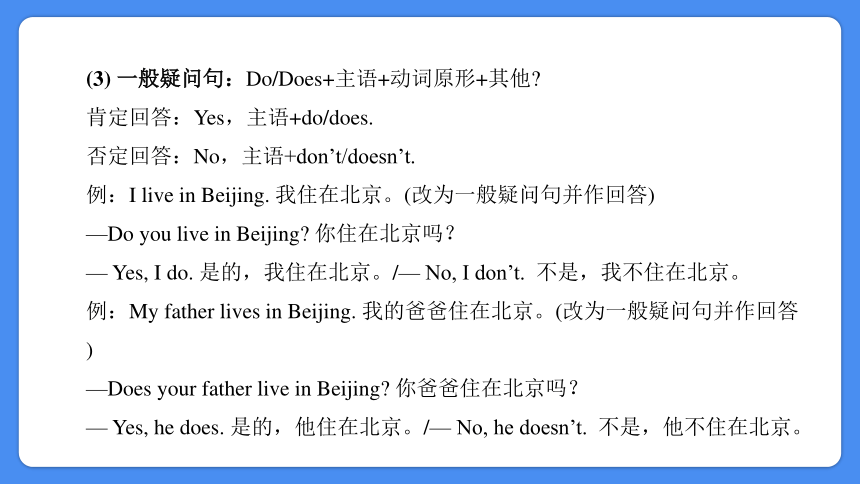
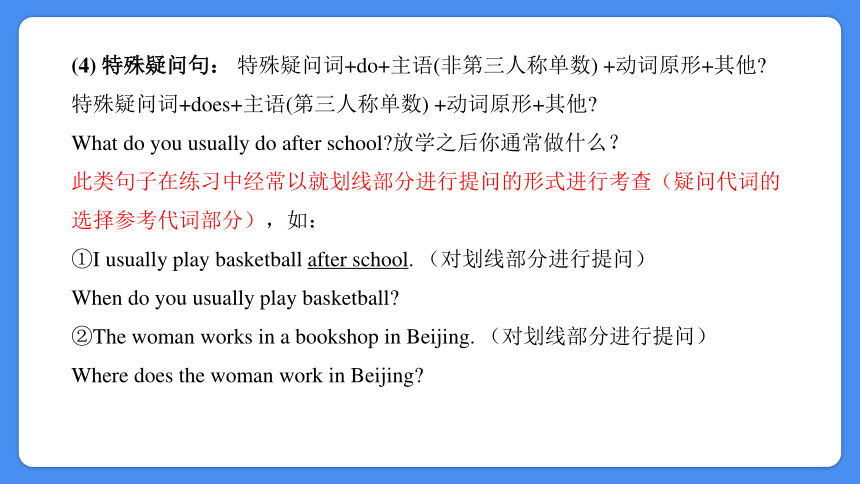
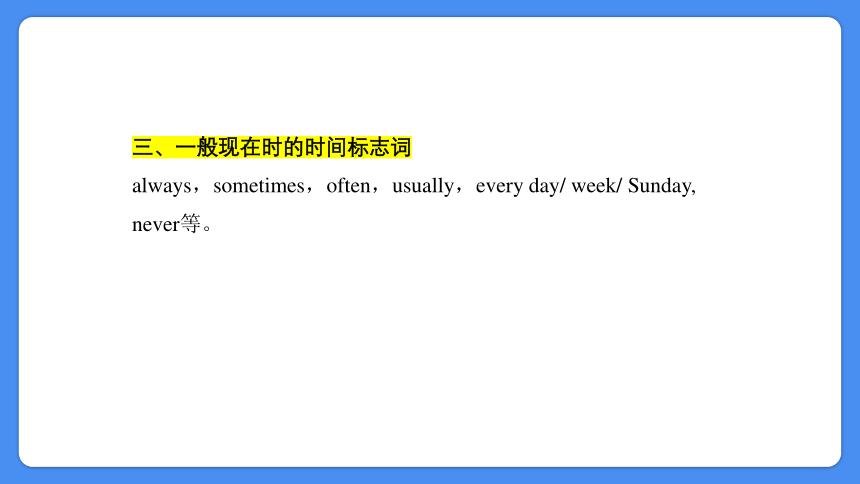
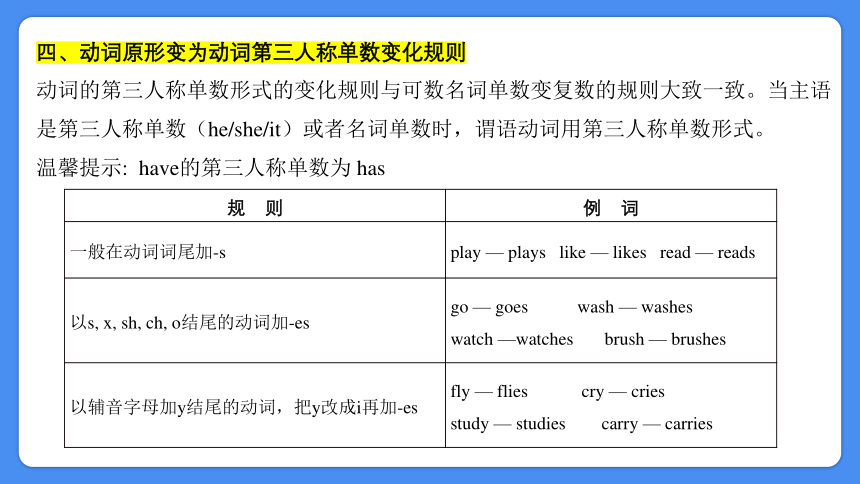
文档简介
(共42张PPT)
第十四讲 时态授课人:小升初英语专题复习知识导图
时态是表示行为动作和状态在不同时间条件下的动词形式。英语中用不同的时态来表示不同时间发生的动作或存在的状态。英语时态有多种,小学阶段常见的四种时态:一般现在时、现在进行时、一般将来时和一般过去时。
定义
一般现在时
考点 1
一、一般现在时的概念
1. 一般现在时是表示经常或反复发生的动作。如:
I watch TV every day. 我每天看电视。
He always goes to work by bus. 他总是坐公交去工作。
Linda usually goes home at six in the afternoon. 琳达常常在下午六点回家。
2. 表示人或事物的特征、状态。如:
Mary is very thin. 玛丽非常瘦。
She is a teacher.她是一名教师。
3. 表示客观事实。如:
The earth goes around the sun. 地球围绕太阳转。
The sun rises (rise) in the east and sets (set) in the west. 太阳东升西落。
二、一般现在时的基本用法
一般现在时的构成及句式变化主要有含be动词和实义动词两种句型。
1. 含有be动词的一般现在时句型
(1) 肯定句:主语+be(am/is/are) +其他,如:
I am (be) a driver. 我是一名驾驶员。
He is (be) a good boy. 他是一个好孩子。
(2) 否定句:主语+be not+其他,如:
They are not (be not) farmers. They are (be) workers.
他们不是农民,他们是工人。
(3) 一般疑问句:Be+主语+其他
肯定回答:Yes,主语+be
否定回答:No,主语+be+not
例: I am from China.我来自中国。(改为一般疑问句并作回答)
—Are you from China 你是来自中国的吗?
—Yes, I am. 是的,我是来自中国。/
—No, I am not.不是,我不是来自中国。
2. 含有实义动词的一般现在时句型。
(1) 肯定句: 主语+动词原形+其他。(主语为非第三人称单数时用)
主语+动词三单+其他。(主语为第三人称单数时用)
注:非第三人称单数为复数,I 和you;第三人称单数为除了I 和you 的所有单数。如:
I go (go) to the library every week. 我每周都去图书馆。
Lingling goes (be) to the bookshop every week. 玲玲每周都去书店。
(2) 否定句:主语+don’t/doesn’t+动词原形+其他。 如:
I don’t like (not like) swimming. 我不喜欢游泳。
She doesn’t like (not like) swimming. 她不喜欢游泳。
(3) 一般疑问句:Do/Does+主语+动词原形+其他
肯定回答:Yes,主语+do/does.
否定回答:No,主语+don’t/doesn’t.
例:I live in Beijing. 我住在北京。(改为一般疑问句并作回答)
—Do you live in Beijing 你住在北京吗?
— Yes, I do. 是的,我住在北京。/— No, I don’t. 不是,我不住在北京。
例:My father lives in Beijing. 我的爸爸住在北京。(改为一般疑问句并作回答)
—Does your father live in Beijing 你爸爸住在北京吗?
— Yes, he does. 是的,他住在北京。/— No, he doesn’t. 不是,他不住在北京。
(4) 特殊疑问句: 特殊疑问词+do+主语(非第三人称单数) +动词原形+其他
特殊疑问词+does+主语(第三人称单数) +动词原形+其他
What do you usually do after school 放学之后你通常做什么?
此类句子在练习中经常以就划线部分进行提问的形式进行考查(疑问代词的选择参考代词部分),如:
①I usually play basketball after school. (对划线部分进行提问)
When do you usually play basketball
②The woman works in a bookshop in Beijing. (对划线部分进行提问)
Where does the woman work in Beijing
三、一般现在时的时间标志词
always,sometimes,often,usually,every day/ week/ Sunday, never等。
四、动词原形变为动词第三人称单数变化规则
动词的第三人称单数形式的变化规则与可数名词单数变复数的规则大致一致。当主语是第三人称单数(he/she/it)或者名词单数时,谓语动词用第三人称单数形式。
温馨提示: have的第三人称单数为 has
规 则 例 词
一般在动词词尾加-s play — plays like — likes read — reads
以s, x, sh, ch, o结尾的动词加-es go — goes wash — washes
watch —watches brush — brushes
以辅音字母加y结尾的动词,把y改成i再加-es fly — flies cry — cries
study — studies carry — carries
现在进行时
考点 2
一、现在进行时的概念
现在进行时表示现在正在进行或发生的动作,或过去一段时间到现在持续发生的动作。
二、现在进行时的句式结构
主语+be动词(am, is, are) + 动词ing+ 其他
三、现在进行时的句式用法
1. 肯定句:主语+be+动词ing+其他。如:
I am reading (read) books now. 我现在正在看书。
2. 否定句:主语+be+not+动词ing+其他。如:
She isn’t flying (not fly) kites in the park.
她现在不在公园里放风筝。
3. 一般疑问句:Be+主语+动词ing+其他?
肯定回答:Yes, 主语+be.
否定回答:No, 主语+be not. 如:
例:I am doing my homework at home. (改为一般疑问句并作回答)
—Are you doing your homework at home
—Yes, I am./—No, I am not (或者No, I’m not)
4. 特殊疑问句:特殊疑问词+be+主语+动词ing+其他?如:
What are you doing, Daming 大明,你正在做什么?
例:My sister is playing the piano. (就划线部分进行提问)
What is your sister doing
四、现在进行时的时间标志词
now(现在) ,listen(听) ,look(看) ,at the moment (此时此刻) 。
五、动词原形变为动词ing形式的变化规则
1. 一般在动词的词尾直接加ing。
play—playing work—working do—doing
2. 以不发音字母e结尾的动词,先去掉e再加ing。
have—having write—writing make—making
3. 以辅元辅结尾的单音节的动词,双写最后一个辅音字母,再加ing。
swim—swimming run—running shop—shopping
put—putting cut—cutting get—getting drop—dropping
一般将来时
考点 3
一、一般将来时的概念
一般将来时表示将来某个时间要发生的动作或存在的状态。如:
I am going to play football tomorrow.我明天打算去踢足球。
Amy will be 12 years old next year. 艾米明年计12岁了。
There will be a football match in our school next week.
我们学校下周将举行一场足球比赛。
二、一般将来时的动词结构
①主语+be going to + 动词原形+其它。
②主语+will + 动词原形+其它。
三、一般将来时的句式结构
1. 含有be going to的句型
(1) 肯定句:主语+ be going to +动词原形+其他。如:
I'm going to have a picnic this afternoon. 今天下午我将要去野餐。
(2) 否定句:主语+be+ not going to +动词原形+其他。如:
I'm not going to have a picnic this afternoon. 今天下午我将不去野餐。
(3) 一般疑问句:Be +主语+ going to +动词原形+其他?
肯定回答:Yes, 主语+be.
否定回答:No, 主语+ be + not. 如:
例:I am going to have a picnic this afternoon. 我今天下午要去野餐。(改为一般疑问句并作回答)
—Are you going to have a picnic this afternoon 你今天下午将要去野餐吗?
—Yes, I am. 是的,我要去。/—No, I’m not. 不,我不去。
(4) 特殊疑问句:特殊疑问词+一般疑问句?
What are you going to do tomorrow 你明天将要去做什么?
例:Sam is going to have a birthday party this Friday. (对划线部分进行提问)
What is Sam going to have this Friday
2. 含有will的句型
(1) 肯定句:主语+ will +动词原形+其他。如:
I will play (play) football tomorrow. 我明天将要去踢足球。
(2) 否定句:主语+ won’t +动词原形+其他。如:
I won’t play (not play) football tomorrow. 我明天将不去踢足球。
温馨提示:will和not的缩写是won’t而不是willn’t。
(3) 一般疑问句:Will +主语+动词原形+其他?
肯定回答:Yes, 主语+will.
否定回答:No, 主语+won’t. 如:
例:I will play football tomorrow. 我明天将要去踢足球。(改为一般疑问句并作回答)
—Will you play football tomorrow 你明天将要去踢球吗?
—Yes, I will. 是的,我会去。 /—No, I won’t. 不,我不去。
(4) 特殊疑问句:特殊疑问词+一般疑问句?如:
What will you do tomorrow 你明天将要做什么?
例:Lingling will go to the park next Sunday. (对划线部分进行提问)
What will Lingling do next Sunday 玲玲下周日将要去做什么?
温馨提示:在句型转换中如遇到第一人称的陈述句变为疑问句时,要把第一人称变成第二人称。如:
I am going to go to the zoo tomorrow.
变成一般疑问句为: Are you going to go to the zoo tomorrow
四、一般将来时的时间标志词
tomorrow(明天) ,soon(不久) ,next week(下周) ,next weekend(下周末) ,next year (明年) ,in two days(在未来的两天内) ,in the future(在未来) ,the day after tomorrow(后天),this afternoon/evening(今天下午/下午)
一般过去时
考点 4
一、一般过去时的概念
一般过去时表示过去发生的动作或存在的状态。如:
I saw him in the park yesterday. 我昨天在公园里见到他。
I was ten years old last year. 去年,我十岁。
二、一般过去时的结构
句式结构:主语+动词的过去式(动词+ed) +其他成分 如:
He did (do) his homework this morning. 他今天早上在做家庭作业。
三、一般过去时的用法
1. 含有be动词的一般过去时句型
(1) 肯定句:主语+was/were +其他 如:
They were (be) happy just now. 他们刚才非常的开心。
He was (be) born in 1998. 他出生于1998年。
(2) 否定句:主语+ wasn’t/weren’t +其他 如:
They weren’t happy just now. 他们刚才不是很开心。
(3) 一般疑问句:Was/Were+主语+其他?
肯定回答:Yes, 主语+was/were.
否定回答:No, 主语+wasn’t/weren’t.
例:They were at home just now. (改为一般疑问句并作回答)
—Were they at home just now
—Yes, they were. /—No, they weren’t.
2. 含有行为动词的一般过去时的句型
(1) 肯定句:主语+动词的过去式(动词+ed) +其他 如:
The old man lived in America last year. 这位老人去年居住在美国。
(2) 否定句:主语+didn’t +动词原形+其他 如:
The old man didn’t live (not live) in America last year.
这位老人去年没有居住在美国。
(3) 一般疑问句:Did +主语+动词原形+其他
肯定回答:Yes, 主语+did.
否定回答:No, 主语+didn’t.
例:The old man lived in America last year. (改为一般疑问句并作回答)
—Did the old man live in America last year
—Yes, he did. /—No, he didn’t.
(4) 特殊疑问句:特殊疑问词+did+主语+动词原形+其他? 如:
What did Lucy do last weekend 露西上周做了什么?
例:David went to the zoo last Saturday. (对划线部分进行提问)
What did David do last Saturday.
四、一般过去时的时间状语
yesterday(昨天), just now(刚刚), last week/night/month/year(上周/昨晚/上个月/去年), …ago (…以前)等。
五、动词过去式的变化规则
规 则 例 词
一般在动词词尾加-ed help — helped walk — walked
work — worked talk—talked
以不发音e结尾的动词,直接加-d like — liked love — loved
hope — hoped skate— skated
以辅音字母加y结尾的动词,改y为i,再加-ed study — studied cry — cried
carry — carried try — tried
以辅元辅结尾的单音节的动词,双写最后一个辅音字母,再加-ed plan — planned stop — stopped
drop — dropped prefer — preferred
温馨提示:动词过去式的不规则变化可以参考如下表格。
原形 过去式 中文 原形 过去式 中文
am/is was 是 lose lost 失去
are were 是 make made 制作
become became 成为 meet met 遇见
begin began 开始 put put 放
bring brought 带来 read read 读
buy bought 买 ride rode 骑
can could 能;会 ring rang 铃响
come came 来 run ran 跑
do/does did 做 say said 说
draw drew 画画 see saw 看见
drink drank 喝 sell sold 卖
eat ate 吃 sit sat 坐
fall fell 落下 send sent 发送
feel felt 感觉 speak spoke 说
fly flew 飞 spend spent 花费;度过
forget forgot 忘记 swim swam 游泳
get got 得到 take took 带;拿
give gave 给 teach taught 教
go went 去 tell told 告诉
have/has had 有;吃 wear wore 写
hang hung 悬挂 will would 可能会
know knew 知道 win won 赢,获胜
learn learnt 学习 write wrote 写
典例分析
1. He often (have)dinner at home.
2. Daniel and Tommy (be) in Class One.
3. We (not watch) TV on Monday.
4. Nick (not go) to the zoo on Sunday.
5. they (like) the World Cup
6. What they often (do)on Saturdays
1. has 2. are 3. don’t watch
4. didn’t go 5. Do; like 6.do;do
典例分析
7. your parents (read) newspapers everyday
8. The girl (teach)us English on Sundays.
9. She and I (take) a walk to get here very evening.
10. There (be) some water in the bottle.
11. Mike (like)cooking.
12. They (have) the same hobby.
13. My aunt (look)after her baby carefully.
14. You always (do)your homework well.
7. Do;read 8. teaches 9. take 10. is
11. likes 12. have 13. looks 14. do
典例分析
15. I (be)ill.I’m staying in bed.
16. She (go) to school from Monday to Friday.
17. Liu Tao (do)not like PE.
18. The child often (watch) TV in the evening.
19. Su Hai and Su Yang (have) eight lessons this term.
20. -What day (be)it today
- It’s Saturday.
21.The boy (draw)a picture now.
22. Listen.Some girls (sing)in the classroom .
15.am 16. goes 17. does 18. watches 19. have
20. is 21. is drawing 22. aresinging
典例分析
23. My mother (cook)some nice food now.
24. What you (do)now
25. Look!They ( have) an English lesson .
26. They (not,water) the flowers now.
27. Look! The girls (dance )in the classroom .
28. What is our granddaughter doing She (listen) to music.
29.It’s 5o’clock now.We (have)supper now.
30. Helen (wash )clothes Yes, she is.
23. is cooking 24. are; doing 25. are having 26. aren’t watering
27. are dancing 28. is listening 29. are having 30. Is; washing
典例分析
31.Today is a sunny day.We (have)a picnic this afternoon.
32.My brother (go) to Shanghai next week.
33.Tom often (go)to school on foot.
But today is rain.He (go) to school by bike.
34.What do you usually do at weekends
I usually (watch)TV and (catch)insects
35.It's Friday today. What she (do)this weekend
She (watch) TV and (catch)insects.
31. will have 32. will go 33.goes; will go
34. watch; catch 35. will; do; will watch; catch
典例分析
36.What (do)you do last Sunday I (pick) apples on a farm.
What you (do) next Sunday I (milk)cows.
37.Mary (visit)her grandparents tomorrow.
38.Tiu Tao (fly) kites in the playground yesterday.
39.David (give)a puppet show next Monday.
40. I (plan) for my study now.
41. I (watch) a cartoon on Saturday.
42.Her father (read)a newspaper last night.
36. did; picked; will; do; will milk 37. will visit
38. flew 39. will give 40. am planning 41. watched 42. read
典例分析
43.We to the zoo yesterday, we to the park tomorrow.(go)
44. you (visit) your relatives last Spring Festival
45. he (fly) a kite on Sunday Yes, he .
46.Gao Shan (pull) up carrots last National Day holiday.
47. I (sweep) the floor yesterday, but my mother (not do).
48. What she (find) in the garden last morning
She (find) a beautiful butterfly.
49. It (be) Ben’s birthday last Friday.
50. We all (have)a good time last night.
43. went; will go 44. Did; visit 45. Did; fly; did 46. pulled
47. swept; didn’t 48. did; find; found 49. was 50. had
授课人:Thank you!
第十四讲 时态授课人:小升初英语专题复习知识导图
时态是表示行为动作和状态在不同时间条件下的动词形式。英语中用不同的时态来表示不同时间发生的动作或存在的状态。英语时态有多种,小学阶段常见的四种时态:一般现在时、现在进行时、一般将来时和一般过去时。
定义
一般现在时
考点 1
一、一般现在时的概念
1. 一般现在时是表示经常或反复发生的动作。如:
I watch TV every day. 我每天看电视。
He always goes to work by bus. 他总是坐公交去工作。
Linda usually goes home at six in the afternoon. 琳达常常在下午六点回家。
2. 表示人或事物的特征、状态。如:
Mary is very thin. 玛丽非常瘦。
She is a teacher.她是一名教师。
3. 表示客观事实。如:
The earth goes around the sun. 地球围绕太阳转。
The sun rises (rise) in the east and sets (set) in the west. 太阳东升西落。
二、一般现在时的基本用法
一般现在时的构成及句式变化主要有含be动词和实义动词两种句型。
1. 含有be动词的一般现在时句型
(1) 肯定句:主语+be(am/is/are) +其他,如:
I am (be) a driver. 我是一名驾驶员。
He is (be) a good boy. 他是一个好孩子。
(2) 否定句:主语+be not+其他,如:
They are not (be not) farmers. They are (be) workers.
他们不是农民,他们是工人。
(3) 一般疑问句:Be+主语+其他
肯定回答:Yes,主语+be
否定回答:No,主语+be+not
例: I am from China.我来自中国。(改为一般疑问句并作回答)
—Are you from China 你是来自中国的吗?
—Yes, I am. 是的,我是来自中国。/
—No, I am not.不是,我不是来自中国。
2. 含有实义动词的一般现在时句型。
(1) 肯定句: 主语+动词原形+其他。(主语为非第三人称单数时用)
主语+动词三单+其他。(主语为第三人称单数时用)
注:非第三人称单数为复数,I 和you;第三人称单数为除了I 和you 的所有单数。如:
I go (go) to the library every week. 我每周都去图书馆。
Lingling goes (be) to the bookshop every week. 玲玲每周都去书店。
(2) 否定句:主语+don’t/doesn’t+动词原形+其他。 如:
I don’t like (not like) swimming. 我不喜欢游泳。
She doesn’t like (not like) swimming. 她不喜欢游泳。
(3) 一般疑问句:Do/Does+主语+动词原形+其他
肯定回答:Yes,主语+do/does.
否定回答:No,主语+don’t/doesn’t.
例:I live in Beijing. 我住在北京。(改为一般疑问句并作回答)
—Do you live in Beijing 你住在北京吗?
— Yes, I do. 是的,我住在北京。/— No, I don’t. 不是,我不住在北京。
例:My father lives in Beijing. 我的爸爸住在北京。(改为一般疑问句并作回答)
—Does your father live in Beijing 你爸爸住在北京吗?
— Yes, he does. 是的,他住在北京。/— No, he doesn’t. 不是,他不住在北京。
(4) 特殊疑问句: 特殊疑问词+do+主语(非第三人称单数) +动词原形+其他
特殊疑问词+does+主语(第三人称单数) +动词原形+其他
What do you usually do after school 放学之后你通常做什么?
此类句子在练习中经常以就划线部分进行提问的形式进行考查(疑问代词的选择参考代词部分),如:
①I usually play basketball after school. (对划线部分进行提问)
When do you usually play basketball
②The woman works in a bookshop in Beijing. (对划线部分进行提问)
Where does the woman work in Beijing
三、一般现在时的时间标志词
always,sometimes,often,usually,every day/ week/ Sunday, never等。
四、动词原形变为动词第三人称单数变化规则
动词的第三人称单数形式的变化规则与可数名词单数变复数的规则大致一致。当主语是第三人称单数(he/she/it)或者名词单数时,谓语动词用第三人称单数形式。
温馨提示: have的第三人称单数为 has
规 则 例 词
一般在动词词尾加-s play — plays like — likes read — reads
以s, x, sh, ch, o结尾的动词加-es go — goes wash — washes
watch —watches brush — brushes
以辅音字母加y结尾的动词,把y改成i再加-es fly — flies cry — cries
study — studies carry — carries
现在进行时
考点 2
一、现在进行时的概念
现在进行时表示现在正在进行或发生的动作,或过去一段时间到现在持续发生的动作。
二、现在进行时的句式结构
主语+be动词(am, is, are) + 动词ing+ 其他
三、现在进行时的句式用法
1. 肯定句:主语+be+动词ing+其他。如:
I am reading (read) books now. 我现在正在看书。
2. 否定句:主语+be+not+动词ing+其他。如:
She isn’t flying (not fly) kites in the park.
她现在不在公园里放风筝。
3. 一般疑问句:Be+主语+动词ing+其他?
肯定回答:Yes, 主语+be.
否定回答:No, 主语+be not. 如:
例:I am doing my homework at home. (改为一般疑问句并作回答)
—Are you doing your homework at home
—Yes, I am./—No, I am not (或者No, I’m not)
4. 特殊疑问句:特殊疑问词+be+主语+动词ing+其他?如:
What are you doing, Daming 大明,你正在做什么?
例:My sister is playing the piano. (就划线部分进行提问)
What is your sister doing
四、现在进行时的时间标志词
now(现在) ,listen(听) ,look(看) ,at the moment (此时此刻) 。
五、动词原形变为动词ing形式的变化规则
1. 一般在动词的词尾直接加ing。
play—playing work—working do—doing
2. 以不发音字母e结尾的动词,先去掉e再加ing。
have—having write—writing make—making
3. 以辅元辅结尾的单音节的动词,双写最后一个辅音字母,再加ing。
swim—swimming run—running shop—shopping
put—putting cut—cutting get—getting drop—dropping
一般将来时
考点 3
一、一般将来时的概念
一般将来时表示将来某个时间要发生的动作或存在的状态。如:
I am going to play football tomorrow.我明天打算去踢足球。
Amy will be 12 years old next year. 艾米明年计12岁了。
There will be a football match in our school next week.
我们学校下周将举行一场足球比赛。
二、一般将来时的动词结构
①主语+be going to + 动词原形+其它。
②主语+will + 动词原形+其它。
三、一般将来时的句式结构
1. 含有be going to的句型
(1) 肯定句:主语+ be going to +动词原形+其他。如:
I'm going to have a picnic this afternoon. 今天下午我将要去野餐。
(2) 否定句:主语+be+ not going to +动词原形+其他。如:
I'm not going to have a picnic this afternoon. 今天下午我将不去野餐。
(3) 一般疑问句:Be +主语+ going to +动词原形+其他?
肯定回答:Yes, 主语+be.
否定回答:No, 主语+ be + not. 如:
例:I am going to have a picnic this afternoon. 我今天下午要去野餐。(改为一般疑问句并作回答)
—Are you going to have a picnic this afternoon 你今天下午将要去野餐吗?
—Yes, I am. 是的,我要去。/—No, I’m not. 不,我不去。
(4) 特殊疑问句:特殊疑问词+一般疑问句?
What are you going to do tomorrow 你明天将要去做什么?
例:Sam is going to have a birthday party this Friday. (对划线部分进行提问)
What is Sam going to have this Friday
2. 含有will的句型
(1) 肯定句:主语+ will +动词原形+其他。如:
I will play (play) football tomorrow. 我明天将要去踢足球。
(2) 否定句:主语+ won’t +动词原形+其他。如:
I won’t play (not play) football tomorrow. 我明天将不去踢足球。
温馨提示:will和not的缩写是won’t而不是willn’t。
(3) 一般疑问句:Will +主语+动词原形+其他?
肯定回答:Yes, 主语+will.
否定回答:No, 主语+won’t. 如:
例:I will play football tomorrow. 我明天将要去踢足球。(改为一般疑问句并作回答)
—Will you play football tomorrow 你明天将要去踢球吗?
—Yes, I will. 是的,我会去。 /—No, I won’t. 不,我不去。
(4) 特殊疑问句:特殊疑问词+一般疑问句?如:
What will you do tomorrow 你明天将要做什么?
例:Lingling will go to the park next Sunday. (对划线部分进行提问)
What will Lingling do next Sunday 玲玲下周日将要去做什么?
温馨提示:在句型转换中如遇到第一人称的陈述句变为疑问句时,要把第一人称变成第二人称。如:
I am going to go to the zoo tomorrow.
变成一般疑问句为: Are you going to go to the zoo tomorrow
四、一般将来时的时间标志词
tomorrow(明天) ,soon(不久) ,next week(下周) ,next weekend(下周末) ,next year (明年) ,in two days(在未来的两天内) ,in the future(在未来) ,the day after tomorrow(后天),this afternoon/evening(今天下午/下午)
一般过去时
考点 4
一、一般过去时的概念
一般过去时表示过去发生的动作或存在的状态。如:
I saw him in the park yesterday. 我昨天在公园里见到他。
I was ten years old last year. 去年,我十岁。
二、一般过去时的结构
句式结构:主语+动词的过去式(动词+ed) +其他成分 如:
He did (do) his homework this morning. 他今天早上在做家庭作业。
三、一般过去时的用法
1. 含有be动词的一般过去时句型
(1) 肯定句:主语+was/were +其他 如:
They were (be) happy just now. 他们刚才非常的开心。
He was (be) born in 1998. 他出生于1998年。
(2) 否定句:主语+ wasn’t/weren’t +其他 如:
They weren’t happy just now. 他们刚才不是很开心。
(3) 一般疑问句:Was/Were+主语+其他?
肯定回答:Yes, 主语+was/were.
否定回答:No, 主语+wasn’t/weren’t.
例:They were at home just now. (改为一般疑问句并作回答)
—Were they at home just now
—Yes, they were. /—No, they weren’t.
2. 含有行为动词的一般过去时的句型
(1) 肯定句:主语+动词的过去式(动词+ed) +其他 如:
The old man lived in America last year. 这位老人去年居住在美国。
(2) 否定句:主语+didn’t +动词原形+其他 如:
The old man didn’t live (not live) in America last year.
这位老人去年没有居住在美国。
(3) 一般疑问句:Did +主语+动词原形+其他
肯定回答:Yes, 主语+did.
否定回答:No, 主语+didn’t.
例:The old man lived in America last year. (改为一般疑问句并作回答)
—Did the old man live in America last year
—Yes, he did. /—No, he didn’t.
(4) 特殊疑问句:特殊疑问词+did+主语+动词原形+其他? 如:
What did Lucy do last weekend 露西上周做了什么?
例:David went to the zoo last Saturday. (对划线部分进行提问)
What did David do last Saturday.
四、一般过去时的时间状语
yesterday(昨天), just now(刚刚), last week/night/month/year(上周/昨晚/上个月/去年), …ago (…以前)等。
五、动词过去式的变化规则
规 则 例 词
一般在动词词尾加-ed help — helped walk — walked
work — worked talk—talked
以不发音e结尾的动词,直接加-d like — liked love — loved
hope — hoped skate— skated
以辅音字母加y结尾的动词,改y为i,再加-ed study — studied cry — cried
carry — carried try — tried
以辅元辅结尾的单音节的动词,双写最后一个辅音字母,再加-ed plan — planned stop — stopped
drop — dropped prefer — preferred
温馨提示:动词过去式的不规则变化可以参考如下表格。
原形 过去式 中文 原形 过去式 中文
am/is was 是 lose lost 失去
are were 是 make made 制作
become became 成为 meet met 遇见
begin began 开始 put put 放
bring brought 带来 read read 读
buy bought 买 ride rode 骑
can could 能;会 ring rang 铃响
come came 来 run ran 跑
do/does did 做 say said 说
draw drew 画画 see saw 看见
drink drank 喝 sell sold 卖
eat ate 吃 sit sat 坐
fall fell 落下 send sent 发送
feel felt 感觉 speak spoke 说
fly flew 飞 spend spent 花费;度过
forget forgot 忘记 swim swam 游泳
get got 得到 take took 带;拿
give gave 给 teach taught 教
go went 去 tell told 告诉
have/has had 有;吃 wear wore 写
hang hung 悬挂 will would 可能会
know knew 知道 win won 赢,获胜
learn learnt 学习 write wrote 写
典例分析
1. He often (have)dinner at home.
2. Daniel and Tommy (be) in Class One.
3. We (not watch) TV on Monday.
4. Nick (not go) to the zoo on Sunday.
5. they (like) the World Cup
6. What they often (do)on Saturdays
1. has 2. are 3. don’t watch
4. didn’t go 5. Do; like 6.do;do
典例分析
7. your parents (read) newspapers everyday
8. The girl (teach)us English on Sundays.
9. She and I (take) a walk to get here very evening.
10. There (be) some water in the bottle.
11. Mike (like)cooking.
12. They (have) the same hobby.
13. My aunt (look)after her baby carefully.
14. You always (do)your homework well.
7. Do;read 8. teaches 9. take 10. is
11. likes 12. have 13. looks 14. do
典例分析
15. I (be)ill.I’m staying in bed.
16. She (go) to school from Monday to Friday.
17. Liu Tao (do)not like PE.
18. The child often (watch) TV in the evening.
19. Su Hai and Su Yang (have) eight lessons this term.
20. -What day (be)it today
- It’s Saturday.
21.The boy (draw)a picture now.
22. Listen.Some girls (sing)in the classroom .
15.am 16. goes 17. does 18. watches 19. have
20. is 21. is drawing 22. aresinging
典例分析
23. My mother (cook)some nice food now.
24. What you (do)now
25. Look!They ( have) an English lesson .
26. They (not,water) the flowers now.
27. Look! The girls (dance )in the classroom .
28. What is our granddaughter doing She (listen) to music.
29.It’s 5o’clock now.We (have)supper now.
30. Helen (wash )clothes Yes, she is.
23. is cooking 24. are; doing 25. are having 26. aren’t watering
27. are dancing 28. is listening 29. are having 30. Is; washing
典例分析
31.Today is a sunny day.We (have)a picnic this afternoon.
32.My brother (go) to Shanghai next week.
33.Tom often (go)to school on foot.
But today is rain.He (go) to school by bike.
34.What do you usually do at weekends
I usually (watch)TV and (catch)insects
35.It's Friday today. What she (do)this weekend
She (watch) TV and (catch)insects.
31. will have 32. will go 33.goes; will go
34. watch; catch 35. will; do; will watch; catch
典例分析
36.What (do)you do last Sunday I (pick) apples on a farm.
What you (do) next Sunday I (milk)cows.
37.Mary (visit)her grandparents tomorrow.
38.Tiu Tao (fly) kites in the playground yesterday.
39.David (give)a puppet show next Monday.
40. I (plan) for my study now.
41. I (watch) a cartoon on Saturday.
42.Her father (read)a newspaper last night.
36. did; picked; will; do; will milk 37. will visit
38. flew 39. will give 40. am planning 41. watched 42. read
典例分析
43.We to the zoo yesterday, we to the park tomorrow.(go)
44. you (visit) your relatives last Spring Festival
45. he (fly) a kite on Sunday Yes, he .
46.Gao Shan (pull) up carrots last National Day holiday.
47. I (sweep) the floor yesterday, but my mother (not do).
48. What she (find) in the garden last morning
She (find) a beautiful butterfly.
49. It (be) Ben’s birthday last Friday.
50. We all (have)a good time last night.
43. went; will go 44. Did; visit 45. Did; fly; did 46. pulled
47. swept; didn’t 48. did; find; found 49. was 50. had
授课人:Thank you!
